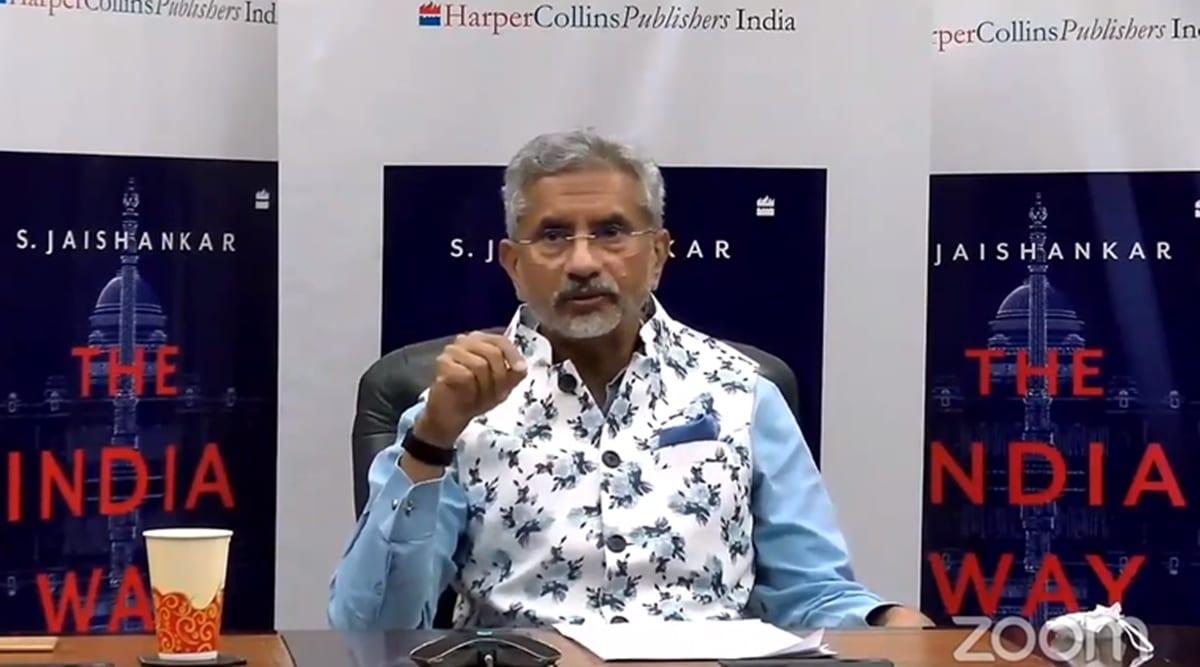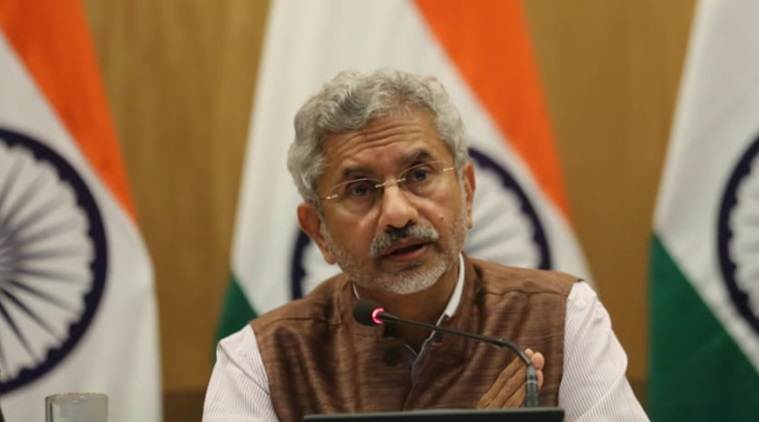 External Affairs Minister S Jaishankar is at the centre of efforts to resolve the border crisis with China
External Affairs Minister S Jaishankar is at the centre of efforts to resolve the border crisis with ChinaExternal Affairs Minister S Jaishankar, who is at the centre of efforts to resolve the border crisis with China in eastern Ladakh, said on Monday peace and tranquility should be basis of relations with the neighbouring country. Speaking at Express E-Adda, he also cautioned that nationalism would be a dominating feature in a post-Covid world.
“India and China have had a difficult recent history. Practical issue is one of disengagement and de-escalation. Indian and Chinese leaders have had informal talks at Wuhan and in Chennai. The conversations were about strategic intentions and posture,” Jaishankar said.
Jaishankar further said India and China had a complex relationship and his responsibility was to steer it in the right direction. “Practical issue is one of disengagement and de-escalation. I am cognisant of all the challenges we have facing. We have problems left over from history,” he said.
The Foreign Minister also said one cannot be a rising power without having a rising economy. “Atmanirbhar Bharat is a policy effort to build national capacities, it doesn’t make India anti-global,” he said. On Covid-19, Jaishankar said the pandemic had raised issues of health security. “A post-Covid world will be more difficult, nations will become more self-centric, debates will become more aggravated and nationalism will be a dominating feature,” he said.
Rising from being a career diplomat to India’s Foreign Secretary to its External Affairs Minister, Jaishankar has had a ringside view of the twists and turns of India’s policy in the neighbourhood and beyond, the deepening of its ties with partners old and new, and the evolution of its rightful claim to a seat at the global high table.
 Jaishankar's new book 'The India Way: Strategies for an Uncertain World' has been released over the weekend
Jaishankar's new book 'The India Way: Strategies for an Uncertain World' has been released over the weekend
That was all from our External Affairs Minister S Jaishankar, who shared with us his thoughts on the border row with China, possible changes in a post-Covid world as well as on his recently relased book 'The India Way: Strategies for an Uncertain World'. Thank you for joing us at this Express e-Adda event.
S Jaishankar says it was time for India to re-assert its interest in multilateralism. "The Indian way is to do more with the world. It is in our interest that the world has rules, not imposed by any one or a few powers. It is time to re-assert our interest in multilateralism. India wants world to think more better for India," he says.
When asked whether China was trying to encircle India apart from Ladakh, Jaishankar says, "It is a competitive world. We cannot expect any power to refrain from pushing its limits. If there is one big neighbour with whom relations have changed in past few years, it is Bangladesh. Our 'Look East' policy starts with Bangladesh. We need to have a different view of our neighbours."
In terms of application of technology, Europe has strengths that are phenomenal, says Jaishankar. "Europe has capabilities and experiences valuable for India. It is one of India's strongest economic partners. Very bullish on India's relationship with Europe," he says.
Jaishankar says one domain where India has made rapid strides is on the digital side. "Our digital capabilities have improved in the last 5 years so much so that we can look to strengthen contact tracing (of potential Covid-19 patients) using a mobile app," he says.
On Covid-19, S Jaishankar says the pandemic has raised issues of health security. "Because Covid disrupted economies, it highlighted importance of global supply chains. Post-Covid world will be more difficult, nations will become more self-centric, debates will become more aggravated and nationalism will be a dominating feature," he says.
Multilaterilism is a necessity, while multipolarity is an inevitability, says Jaishankar. "Greater multipolarity will make multilaterilism more complex. There should be broader ownership of world politics," he says.
Foreign Minister S Jaishankar says one cannot be a rising power without having a rising economy. "Manufacturing has been impacted from cheap imports from outside. Sources of import are often economies where advantages of subsidies are given. Deficits with certain countries have gone very high. A time has come where we have to give our own industry level-plaing field at home. Today we must be sensitive of building capabilities at home. Atmanirbhar Bharat is a policy effort to build national capacities, it doesnt make India anti-global," Jaishankar says.
On relations with the United States, which has entered the home stretch of a hugely consequential presidential election, Jaishankar says we have to look what is happening in America from India's interests. "We cannot get sucked into their debates. We have engaged with US presidents from India's national interest perspective," he says. The suspicion regarding America is much of a Lutyens Delhi problem, the Foreign Minister says.
India and China have a complex relationship and my responsibility is to steer it in the right direction, says Jaishankar. "Practical issue is one of disengagement and de-escalation. I am cognisant of all the challenges we have facing. We have problems left over from history," he says.
India and China have had a difficult recent history, says S Jaishankar. He further says that peace and tranquility should be basis of relations with China. "Indian and Chinese leaders have had informal talks at Wuhan and in Chennai. The conversations were about strategic intentions and posture," he says.
When a country tries to rise, Newton's "third law of politics" comes into play. "For every rise there will be a pushback. At the end of the day, what matters whether you will rise and stand up to your core interests," says Jaishankar.
Speaking on his new book 'The India Way: Strategies for an Uncertain World', Jaishankar says it is based on his insights to the changing global order. "Even with friends, we have differences. The entire ecosystem is changing. This is the kind of world we have to be prespared for," he says.
S Jaishankar's new book 'The India Way: Strategies for an Uncertain World' has been released over the weekend. With the period from the 2008 global financial crisis to the 2020 coronavirus pandemic seeing a real transformation of the world order, Jaishankar analyses the challenges India faces and spells out possible policy responses in the book. As India rises in the world order, it should not only visualise its interests with great clarity but also communicate them effectively, he writes in the book.
Rising from being a career diplomat to India’s Foreign Secretary to its External Affairs Minister, Jaishankar has had a ringside view of the twists and turns of India’s policy in the neighbourhood and beyond, the deepening of its ties with partners old and new, and the evolution of its rightful claim to a seat at the global high table.
Welcome to our live. At today's Express E-Adda, our guest is External Affairs Minister S Jaishankar. The minister is at the centre of efforts to resolve the border crisis with China and will share his views at a time when the Covid-19 pandemic has spotlighted increasing uncertainties in international relations.